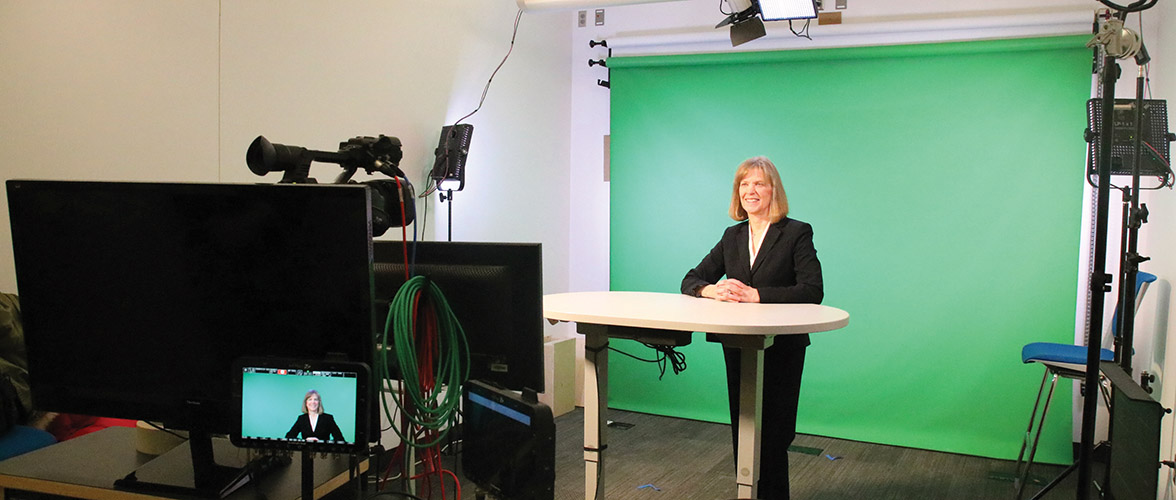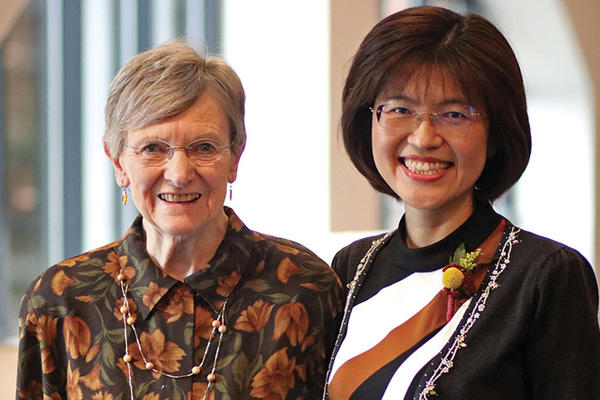Improving health by driving transformation
Partnership with Coursera produces new nursing informatics leadership specialization
March 21, 2019
Steve Rudolph

Informatics has the potential to improve the quality of health care as well as control its costs.
Nursing leaders, with clinical and informatics skills, are ideally positioned to drive this transformation.
Driving transformation in improving health is why the School of Nursing has partnered with Coursera, the global leader in online learning, to offer a new specialization for nurses and interprofessional health care clinicians and leaders that provides the informatics leadership skills they need to be successful in complex organizations.
The specialization, which consists of five courses and a capstone assignment, explores the principles of nursing informatics leadership and applications and enriches participants’ self-knowledge of their skills to promote stakeholder collaboration
and achieve mutual goals.
People, relationships critical in informatics
“Every nursing informatics leader interviewed at the 2018 Nursing Knowledge: Big Data Science Conference told us it’s the people and it’s the relationships,” said Associate Professor Karen Monsen, PhD, RN, FAMIA, FAAN, who led the effort to create the specialization and developed one of the University’s first Coursera courses in 2012. “As informaticians, we need to better understand the people side and realize there are a wide range of scenarios in which we have to employ informatics skills. That’s what these courses do.”
Monsen and colleagues turned to leadership literature, models and principles in developing the courses. They discovered the importance of the competing values framework, which is the idea that, to be successful, nursing informatics leaders have to bring people with competing values together to solve high-profile, high-impact problems.
“Many of our future students will be in countries where health care informatics is just beginning to develop. These videos will bring to life a community of expert nursing informatics leaders as role models and key informants, sharing their experiences and wisdom.”
– Karen Monsen, associate professor
Videos featuring national nursing informatics leaders are incorporated throughout the courses to bring informatics leadership theory to life and to showcase diversity of thought and scenarios leaders are likely to face. “We wanted to bring real-world perspective to this space,” said Monsen. “Many of our future students will be in countries where health care informatics is just beginning to develop. These videos will bring to life a community of expert nursing informatics leaders as role models and key informants, sharing their experiences and wisdom.”
New inventory shows how leaders respond
Another component of the specialization was the development of the Minnesota Nursing Informatics Leadership Inventory (MNILI), a tool that describes how nursing informatics leaders respond with their leadership skills to different scenarios.
“The MNILI is an open source tool that can share new ideas and new ways of thinking about service to the informatics community and improving health care,” said Monsen. “As we say in the specialization, nursing informatics leaders align people, process and purpose in service to the greater good.”
Other School of Nursing faculty who participated in the development of the specialization and instruct the courses are Professor Daniel Pesut, PhD, RN, FAAN, Associate Professor Emeritus Bonnie Westra, PhD, RN, FAAN, FACMI, Clinical Professor Ad Honorem Thomas Clancy, PhD, RN, FAAN, and Professor and Dean Connie White Delaney, PhD, RN, FAAN, FACMI, FNAP.
The Nursing Informatics Leadership Specialization is part of a portfolio of health-related online offerings created by Coursera and 15 top-ranked universities to help address the global shortage of skilled workers in the health care industry.
“I’m excited to see Coursera and its partners coming together to help realize that potential by providing access to flexible and affordable education options that can help usher in the next generation of health care workers in high-demand fields like health informatics, health care management and public health,” said Daphne Koller, co-founder of Coursera.
“Empowering the triad of nursing clinical and education leadership, nursing informatics expertise and our commitment to health and quality of health care through this first-of-its-kind Coursera offering is another bold strategy to transcend the challenge of leveraging information systems,” said Delaney. “The University of Minnesota School of Nursing celebrates lifting up big data science informatics experts and we celebrate offering the unique Minnesota Nursing Informatics Leadership Inventory to all.”

